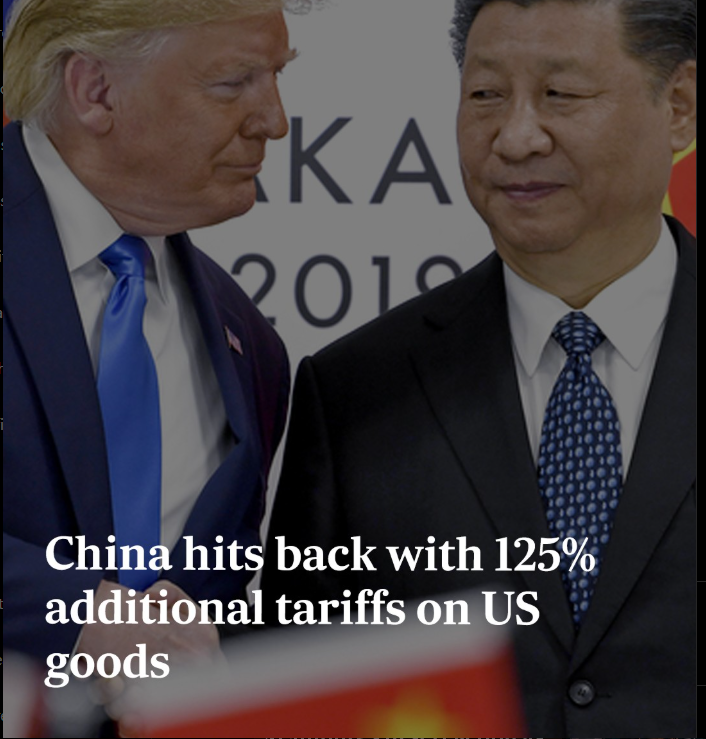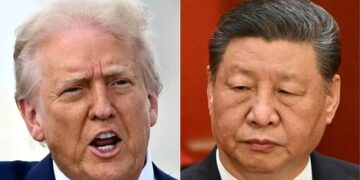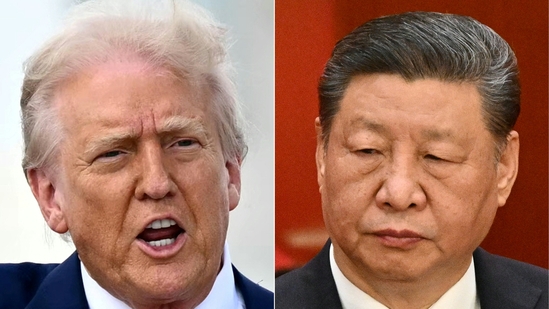China’s Ministry of Finance announced on Friday that it has increased tariffs on a range of U.S. imports, raising the rate from 84% to a steep 125%. The decision signals a sharp escalation in trade tensions between the two economic powerhouses.
China Slams U.S. Tariffs as ‘Unilateral Bullying’, Raises Duties on American Goods to 125%
In a sharp escalation of trade tensions, China’s Ministry of Finance announced on Friday that it has significantly increased tariffs on certain U.S. imports, raising them from 84% to a steep 125%.
The decision comes in response to what Beijing describes as the United States’ imposition of “abnormally high tariffs” on Chinese goods—an action that the ministry says flagrantly violates international trade rules and disregards basic economic principles.
“The U.S. actions seriously undermine the norms of global trade, breach basic economic logic, and reflect complete unilateral bullying and coercion,” the ministry stated, as reported by Reuters.
This latest move is expected to further strain U.S.-China economic relations and may impact global trade dynamics in the coming months.
China’s Ministry of Foreign Affairs warned that any continued infringement on China’s core interests by the United States would be met with decisive countermeasures. “If the U.S. insists on acting in ways that harm China’s fundamental interests, we will not back down. China will respond resolutely and fight to the end,” the ministry declared.
Meanwhile, China’s Ministry of Finance also addressed the ongoing tariff dispute, stating that if the United States moves forward with imposing new tariffs on Chinese exports, China will not be deterred. “Any additional tariffs by the U.S. will be ignored,” the ministry emphasized, signaling Beijing’s resolve to stand firm in the face of economic pressure.
In a strong diplomatic message, Chinese President Xi Jinping has called on the European Union to collaborate with Beijing in opposing what he termed as “unilateral bullying.” The remarks come in response to the economic unrest triggered by U.S. President Donald Trump’s aggressive tariff measures, which have sent shockwaves through global markets. Xi emphasized the importance of multilateral cooperation and mutual respect, positioning China and the EU as potential partners in maintaining global trade stability amidst rising tensions.

Tensions between China and the United States continue to rise as both nations engage in a tit-for-tat trade dispute, marked by soaring tariffs and stern rhetoric.
According to AFP, a Chinese leader urged both China and Europe to “fulfil their international responsibilities and jointly resist unilateral bullying practices,” in a clear message against rising protectionism and trade hostility.
This statement follows the recent move by US President Donald Trump, who announced an aggressive 125% tariff on Chinese goods earlier this week. When combined with a separate 20% tariff related to China’s alleged role in fentanyl production, the total tariff burden on Chinese imports now stands at a staggering 145%.
In response, China hit back with an 84% tariff on all imports from the United States, announced late Wednesday—shortly after Trump’s latest tariff escalation to 104%. The escalating trade war shows no signs of easing.
On Tuesday, Chinese officials pledged to “fight to the end” against what they describe as unfair US trade practices, though they also expressed a willingness to reopen dialogue with Washington. Meanwhile, Beijing has stepped up measures to stabilize its financial markets, with state-backed funds reportedly purchasing equities and exchange-traded funds (ETFs) to support investor confidence.
The global community watches closely as the two economic giants square off, with potential ripple effects for international trade, supply chains, and economic growth worldwide.
Despite the relative resilience of Chinese equities, growing geopolitical tensions between China and the U.S. are prompting some global investors to scale back their exposure.
According to a Bloomberg report, concerns over deteriorating bilateral relations triggered a sharp selloff on Wednesday. Three of the largest U.S.-listed exchange-traded funds (ETFs) that track Chinese stocks saw significant outflows, with traders offloading nearly $1 billion worth of shares in just one day.
This substantial shift reflects the increasing caution among international investors navigating the uncertainties in the current global landscape. As geopolitical risks rise, many are reevaluating their positions in Chinese markets despite positive economic indicators and market performance.
Read Also
“Not Acceptable”: RCB Skipper Rajat Patidar Criticizes Batting Collapse After Defeat to DC















 Categories
Categories









